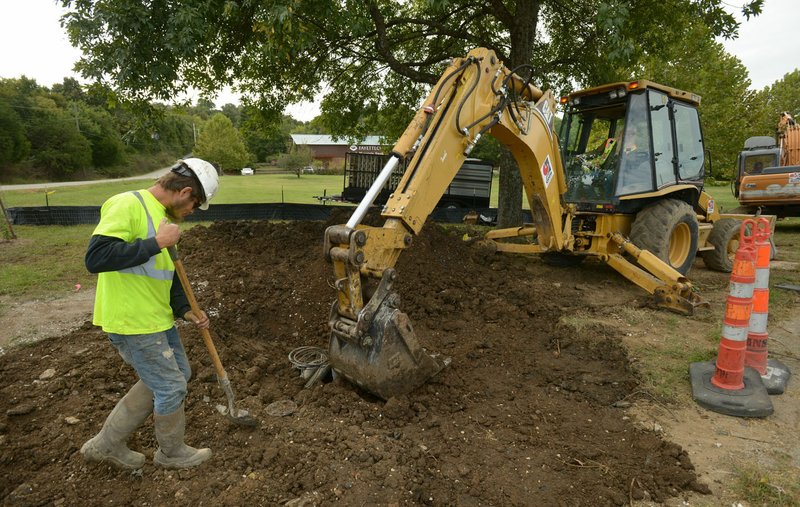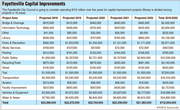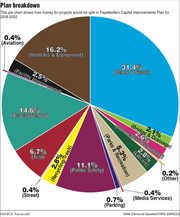FAYETTEVILLE — The money the city has coming in for projects over five years will help maintain the status quo, but grander ambitions will require a separate bond issue.
The City Council will vote Tuesday on the proposed Capital Improvements Plan for 2018-2022. The plan calls for a certain amount of money to be set aside for things such as installing water and sewer lines, repaving roads and buying vehicles and equipment. The council will decide the amounts at the end of the year when it approves a budget.
Other cities
Here’s how other Northwest Arkansas cities handle their capital improvement plans:
• Springdale has a capital improvements fund used for maintenance as needed, but larger projects are paid for through a bond issue.
• Rogers doesn’t have a capital improvements fund, but major projects are paid for through bond issues not in the annual budget.
• Bentonville adopted a five-year Capital Improvements Plan in 2002 which is regularly updated. It also has a bond program for major projects.
Source: Staff report
City officials have regularly updated a five-year capital plan since 1988. The latest revision would put more than $112 million toward projects across various departments.
About 41 percent of the revenue used to spend on capital projects comes from sales tax. The rest comes from fees from various funds, such as water and sewer, recycling and trash, streets and the shop fund for vehicles, according to city finance documents.
Some revenue has to be used for specific purposes. Fees collected from the water and sewer fund, for example, can only be used for water and sewer improvement. The revenue from 40 percent of a 1-cent sales tax can go to just about anything. The other 60 percent of the 1-cent sales tax revenue goes into the general fund for operations.
The last time the City Council approved a five-year Capital Improvements Plan was in 2014. The amount of money was about the same.
Council members can change what they want about the plan for the next five years, Chief Financial Officer Paul Becker said.
Most of the capital improvements proposal, about 31 percent or $34.9 million over five years, would go to water and sewer improvement.
City crews will use $325,000 over five years to replace as many aging water meters as they can. Keeping the wastewater treatment plants going will take at least $7.1 million. Maintaining, replacing or moving water and sewer lines is a nearly $22 million endeavor, according to Becker’s projections.
An outside consultant will do a rate study next year to make sure the revenue stream is adequate, Utilities Director Tim Nyander said. To keep up with ongoing costs, the water and sewer rates for customers automatically rise 3 percent each year, he said.
About $24 million will be needed to keep sidewalks, streets and trails up to snuff. That chunk, plus water and sewer, accounts for nearly 53 percent of the entire Capital Improvements Plan.
Transportation crews put resident-requested sidewalk and road improvements on their work list every year. Next year’s projects will be decided in November, Transportation Director Terry Gulley said.
City Engineer Chris Brown in June gave council members a ballpark estimate of $20 million needed for drainage improvement. Significant flooding April 28-30 revealed problematic areas in the city and officials have discussed ways to pay for the work.
Becker added $200,000 to the allotment for drainage in 2018 since the last update to the Capital Improvements Plan, pushing the total to $610,000. The amount over five years is $2.4 million.
The council in August agreed to spend no more than $200,000 to study the feasibility of a storm water utility fee. How much the fee could bring in or how much customers would be charged won’t be known until the study is completed sometime in early 2019, Brown said.
Using money from the Capital Improvements Plan and a storm water utility fee still leaves millions needed to take on a large-scale drainage project. A bond program almost assuredly would have to happen, Brown said.
“There always will be drainage issues,” he said. “I think we can go a long ways in providing much better service than we’re providing now through those various mechanisms, and get some of the glaring deficiencies that we’ve had that we’ve never had funding for corrected.”
Voters approved a $65 million bond issue in 2006. Using that and $24.6 million in state and federal money, the city has completed $100 million of projects, Brown said.
That original bond issue soon will be paid off and city officials have turned their heads toward another bond package. Many projects could get checked off the list, including $19 million to finish extending Rupple Road to Arkansas 112, $21 million to finish the final phase of Kessler Mountain Regional Park or $7.2 million for a new fire station.
Mayor Lioneld Jordan during a meeting Tuesday asked council members to get their wish lists ready. Staff members have been working on project proposals and Jordan said he wanted to have something ready to present to voters by early next year.
“A lot of the unfunded projects, we’re going to have to look at a bond issue,” he said. “There’s just not much way around that.”
Stacy Ryburn can be reached by email at [email protected] or on Twitter @stacyryburn.



